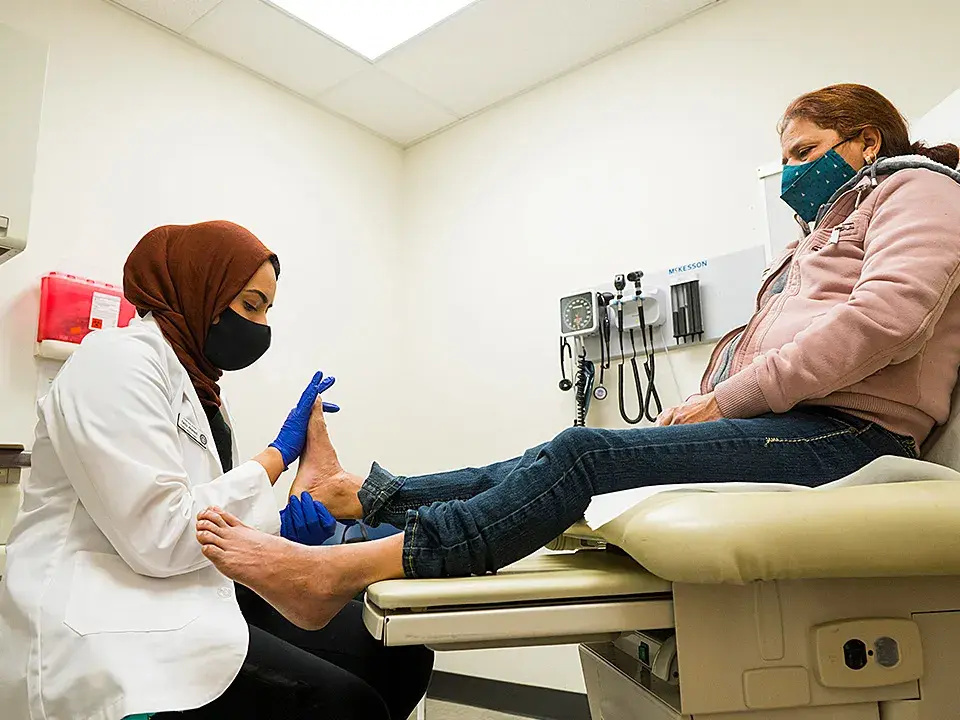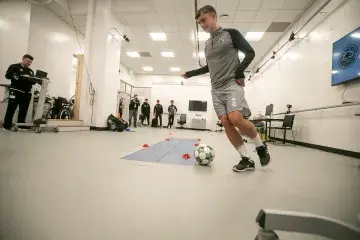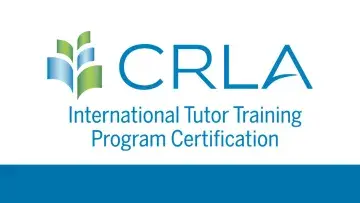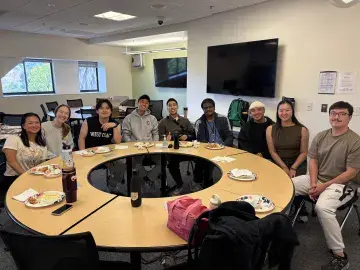Best Feet Forward

On a cool evening in March, Ronnie Price walks a gentle-eyed Chihuahua mix around a pop-up health and social services clinic in the brick courtyard of the First Presbyterian Church in Berkeley. The clinic is run by aspiring healthcare professionals, many of them in scrubs, who are working on university degrees.
Ronnie checks out booths and greets people he knows from the streets. Some mill about the courtyard with shopping carts filled with personal belongings. A few, like Ronnie, have brought their pets. Looking around, he approaches a table with a sign: “The Podiatry Service Free Foot and Ankle Care.”
Kate Cryderman, DPM ’23, a third-year podiatry student in blue scrubs behind the table, smiles as Ronnie takes a seat in the exam area where her peers are assessing, treating, and talking to people with foot problems. “Sir, do you want me to look at your feet? Or are you just interested in getting shoes today?” Kate asks.
Ronnie looks down at his black loafers, which seemed too snug. “I,” he stammers, “I don’t have any socks.”
“That’s okay. We can get you socks, too,” says Kate, and begins to examine his feet.
Ronnie, who lives in a van nearby, says he’s thankful that Kate and her peers from SMU’s California School of Podiatric Medicine (CSPM) are at the clinic, called the Suitcase Clinic, helping him and others with foot problems who have no money or insurance to pay for podiatric care.
“My life out here is kind of rough because I don’t have a home. So, I came here for the resources,” Ronnie says. “It helps me a lot, you know what I mean?”
Kate, who has been volunteering since the clinic resumed in the wake of COVID-19, says she’s glad to be able to help.
“I think I’m very fortunate in the way I grew up and being in the position I am to become a doctor and to give back by helping people who aren’t in the best way in the current time of their lives,” she says.
Welcome to the Suitcase Clinic
Anna Guo, DPM ’23, and Stephanie Liu, DPM ’23, lead Kate and about 12 SMU podiatry students, providing weekly foot and ankle care at the student-run Suitcase Clinic. In addition to podiatry, the clinic offers an umbrella of services from UC Berkeley public health and social services students as well as partner nonprofits that provide housing assistance, rehabilitation resources, and meals for underserved and unhoused residents.
“The unhoused population is always on their feet,” Anna says. “So, they end up with ingrown toenails, fungal nail infections, calluses, painful bunions, and bruises that won’t heal. While you or I could go see a podiatrist, they can’t. And if unchecked, these are things that can lead to much more serious problems.”
So far, the clinic has seen close to 100 patients since resuming visits in August 2021. That includes a pause during the winter Omicron spike. The numbers are just as impressive at two SMU-led foot clinics launched in Sacramento, and in San Francisco where students recently resumed a 30-year partnership with the city. In all, several thousand clients have received treatment in Berkeley, Sacramento, and San Francisco, says CSPM Dean Eric Stamps, DPM ’93.
“These programs are a win-win for the community and for our students,” says Stamps. “The community receives excellent care, mostly free of charge, and our students receive a valuable opportunity to not only give back but also to gain a hands-on, empathy-building experience that will likely contribute to their growth as podiatric physicians.”
Like Grey’s Anatomy
The San Francisco Bay Area Albert Schweitzer Fellowship program seems to agree with Stamps. The national nonprofit, which supports aspiring health professionals committed to addressing unmet health needs, named Anne and Stephanie fellows and provided seed money for their project.
They used the funds, about $5,500, to buy medical supplies, shoes, and socks—all free to clients. “Many unhoused people suffer from sore and injured feet because they have no shoes or are wearing the wrong size or mismatched shoes,” Anna says.
To ensure the best shoe type and fit, the students evaluate clients’ feet, ask what kind of shoes they want, and have them try on different options that can be ordered. At the Suitcase Clinic in March, Dorothy Wieland—who suffers from a fungal nail infection that caused thickening and discoloration of her nails—has returned for her tennis shoes and smiles as one of the students slips them on her feet and asks how they feel. “I’m happy with the color and how they fit,” she says.
Quietly hovering in the background of the courtyard examination area—set up because of COVID-19—is podiatric physician Jonathan Huey, DPM ’16. He observes each case and consults with students as needed. Huey is a private physician who regularly volunteers to oversee the clinic.
Second-year Shaleen Duhra, DPM ’24, approaches him, sounding a lot like a resident from Grey’s Anatomy, and asks about a patient complaining of pain in her toes. “There were no skin changes, no wounds on her feet, and no range of motion issues,” Shaleen reports.
“So, what are you planning on doing?” Huey asks.
“Well, her main complaint is her toenails,” she said. “So, maybe just trim her nails?”
“That sounds right. You may also want to bring up her smoking,” says Huey, noting that smoking can reduce blood circulation from the heart, which can lead to problems such as poor circulation—especially in limbs like the feet.
When days seem never-ending
As a young girl, Nida Ahmed, DPM ’23, remembers watching her father care for patients as a nurse practitioner at the Sacramento VA Medical Center. In high school, she learned even more about his work while she volunteered at the VA during summers.
“He was constantly serving not only his patients but broadly serving community members in Sacramento with compassion, love, and dedication,” she says. “That inspired me to do the same.”
Since 2018, Nida has been building clinical partnerships that serve the Sacramento community by offering free podiatric care to people in need. That’s the year the Shifa Clinic, where she had been volunteering, accepted her proposal to start a podiatry clinic for the underserved, many of whom suffer from diabetes. Diabetes, Nida explains, can cause neuropathy (loss of sensation) in the feet. And this can lead to ulcers and infection down the line.
“It may seem insignificant to some,” she says, “but that’s not really the case, especially with people who have diabetes who could lose a toe or limb if they allow problems with their feet to go unchecked.”
Now a third-year podiatry student at CSPM, Nida co-directs UC Davis’ student-run clinics, serving low-income, uninsured patients—including Shifa Clinic, which serves many Middle East and South Asia community members, and Clinica Tepati, which serves the Latinx community.
Each week, up to seven CSPM students join her, volunteering their time and skills, Nida says. “Since 2018, we’ve seen around 60 to 70 patients for foot care per year,” she says, adding that the service paused during the pandemic.
“Personally, serving at community clinics reminds me why I chose medicine and why I choose to push through even when the days seem never-ending,” Nida says. “Islam teaches us that serving our neighbors is our communal obligation. Having a deep-rooted love for community is instilled within our teachings. When we serve humanity, we are serving God.”
Return to San Francisco
Before COVID-19, every second-year podiatry student spent a month helping people living in homeless shelters in San Francisco as part of SMU’s Homeless Podiatry Clinic. The clinic cared for as many as 300 people a year thanks to a partnership with the San Francisco Department of Public Health.
“Because there was no requirement for people in shelters to be vaccinated and no protocol for checking their vaccination status, we did not want to unnecessarily expose our students to COVID,” says David Tran, DPM ‘98, the attending physician who now runs the clinic that he rotated through as a student in 1994.
In April, the Homeless Podiatry Clinic restarted for the first time in two years. “Through these partnerships, students learn how to work with podiatry patients, helping them regardless of their social or economic status whilst learning and developing empathy and compassion,” says Tran, who is associate dean of admission and a faculty member.
Kelly Glenn, DPM ’22, says she was lucky to rotate through the Homeless Podiatry Clinic before COVID-19. “The experience was a really good opportunity,” she says. “The clinic was not intimidating because the patients there really wanted—and needed—our help.”
During her month-long experience, she visited several homeless clinics twice a week and saw a “high prevalence of diabetes, toenail fungus, and vascular diseases.” By spending time in those shelters, Kelly saw patients weren’t getting the care they needed.
“I learned that because podiatry is a specialty, they need a primary care referral, but these folks don’t have one. So, who’s going to trim their fungal or ingrown toenails? Perhaps ER? For many, it just goes undone.”
Dean Eric Stamps says he’s proud of the work that CSPM students have done in San Francisco and at the newer clinics in Berkeley and Sacramento.
“The SMU mission is to ‘educate students to become highly skilled and compassionate healthcare providers who positively transform the experience of care in diverse communities,’” he says. “What could be more mission-aligned than that?”
Such volunteer care builds in students a sense of increased empathy for the marginalized and underserved populations in society, according to Stamps.
“I would hope,” he adds, “that this sense of empathy stays with our students as they progress through their career, no matter where they practice—thereby achieving that part of the SMU mission of ‘transforming the experience of care in diverse communities.’”


